Originally Published in Talebones
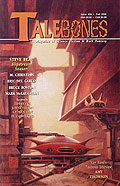 Fall 2000
Fall 2000
Ratings Scale:
***** Hamlet, original signed folio
**** Hamlet, featuring Lawrence Olivier
*** Hamlet, featuring Kenneth Brannagh
** Hamlet, a novel by Danielle Steel
* Hamlet, featuring the cast of “Different Strokes”
Sometimes the melding of classic themes and dramatic melodies with modern pop music yields timeless musical treasure, not to mention the perfect background soundscapes for reading imaginative speculative fiction. This issue’s Bug Music looks at recent albums where the traditional meets the popular…
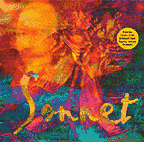 Oberon
Oberon
Sonnet
(Koch)
* * * * 1/2
What could be more historically transcendant than an album featuring dramatic readings of the sonnets of William Shakespeare by actors from London’s famed Globe Theater intertwined with ambient electronic music? Oberon, a duo composed of Taliesin Orchestra keyboardist/producer Trammel Sparks and TV and movie soundtrack vocalist Felicia Sorensen (and featuring a number of other players, including New Age woodwind ace Paul McCandless) provides the music that turns this from a standard recitation of poetry to a transubstantiated work of art.
The music listens like a cross between Enya, Enigma and October Project (with a touch of the Kenny G-ish lite jazz); these songs are swirling streams of the modern and medieval that encircle and support the magical poetry of the bard. Included are readings of Shakespeare’s Sonnets 18, 23, 24, 30, 43, 44, 55, 60, 75, 106, 107, and 116.
While the focus is obviously the beauty of Shakespeare, the power of Oberon’s music should not be overlooked. Sorensen is a wonderfully evocative vocalist and this could easily have been a strong collection of music released on its own, without the drama of the poetry.
Starks has said that “we strive to create memorable melodies with all of the hallmarks of the greatest pop songs. At the same time, our most significant goal is to create recordings that are full of emotion. To this mix we blend world, ambient, and classical influences.”
Oberon definitely succeeds at its mission. Anyone who has ever enjoyed a Shakespearean reading should own this disc and play it often on quiet nights in a dimly lit room with eyes closed. Sonnet is an easy transport to a sonic place of delicate, ageless beauty.
For more information, search the record company web site: www.kochint.com.
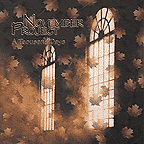 November Project
November Project
A Thousand Days
* * * *
Since I mentioned October Project above, I have to clue in those unfamiliar with the band to their history and latest project. In the mid-’90s, October Project released two beautifully lyrical albums on Epic before being dropped by the label.
The band wove gorgeous melodies with the same sort of folk-meets-pop flair that would later bring success to Loreena McKennitt. Unfortunately, October Project as a band didn’t recover from its poor major label experience, but its core songwriting team of Julie Flanders and Emil Adler did. Five years after October Project’s swan song, Falling Farther In, the two have resurfaced with a new six-piece band in November Project, and pick up where their old outfit left off.
The five songs on this independent debut are stirring creations of depth and layered beauty, centering around new lead vocalist Maryanne Marino, an enormously talented, emotive singer. If you were ever enamored with October Project, or were a fan of other atmospheric, timeless acts like Lorreena McKennitt, Grace Pool or Milla, you need to seek this CD out at: www.novemberproject.com.
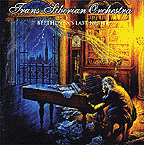 Trans-Siberian Orchestra
Trans-Siberian Orchestra
Beethoven’s Last Night
(Atlantic)
* * * 1/2
TSO’s third album is its first non-holiday release (the band has sold hundreds of thousands of copies of Christmas Eve and Other Stories and The Christmas Attic over the past five years). Can TSO take its grandiose hard rock/opera/classical format outside of the Christmas realm successfully?
The answer, from this listener, is a qualified yes.
The brainchild of Paul O’Neill, producer of hard rock band Savatage and featuring collaboration with the members of Savatage as well as with a number of Broadway talents, TSO was conceived as an ongoing writing project of rock operas that could have performances staged around the country by various touring companies, rather than just as by a single, static “band.”
Fans of the group’s Christmas offerings will recognize plenty of touchstones from the other albums as well as from Savatage’s recent output. This disc’s story revolves around the last night of Beethoven, who is harrangued by Mephistopheles, who seeks to lure the composer into a contract that would eliminate his (fictional) “10th Symphony” from ever being heard by the world.
There are plenty of pounding anthem moments and Oliva’s two vocal treatments of the evil angel are deliciously nasty. Patti Russo (currently with Meatloaf’s band) is gifted with the album’s best material in the anthemic “After the Fall” and the lullabye “A Final Dream.”
To ground the disc in the “classical,”the band rocks up Beethoven’s “Requiem (The Fifth)” and throughout the disc borrows themes from Mozart and other classic composers (as well as Beethoven) and includes a piano run-through of “Fur Elise.” “Ode to Joy” and “Flight of the Bumblebee” also turn up within other songs. It’s a grandiose effort that leaves the listener drained at the end of its 22 tracks. So what’s not to like?
Most of the vocalists presented here are low, growly men, which gives the whole album a dark feel (not necessarily a bad thing, but a little more variance might be good). Also, many of the musical themes and treatments sound too similar to the work that O’Neill and Savatage’s Jon Oliva have been doing now for years with both Savatage and TSO. It’s almost a case of “same song, different words” in some instances. Russo’s big moment in “After the Fall” is a wonderful slow big rock anthem, but it sounds like a carbon of a handful of other “big moment” songs O’Neill and Oliva have written to close out albums over the years.
But these are minor quibbles; nobody else is even creating rock operas these days, so if O’Neill copies himself…well, at least someone is working with the challenging rock opera format. And his results are generally powerful and inspiring. Beethoven’s Last Night is a triumph that once again proves that heavy metal and opera were destined to make beautiful music together.
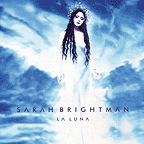 Sarah Brightman
Sarah Brightman
La Luna
(Angel)
* * * 1/2
Sarah Brightman has been straddling the fence of pop and opera for most of her career. A mainstay with the PBS crowd for her renditions of the music of former hubby Andrew Lloyd Webber, her one straight pop album (1993’s Dive) capsized without a ripple.
Still, she’s consistently dabbled in the pop arena, and was half of the reason Andrea Bocelli put opera back in housewives’ homes again when the two scored with the worldwide hit duet from a couple years ago (and title track to her album) “Time To Say Goodbye.”
On La Luna, she divides her time almost equally between gorgeously layered lyrical pop symphonies and operatic drama.
Opening with “This Love,” a cross between the high lilt of Kate Bush and the techno ambience of Robert Miles, she goes on to class up the folk traditional “Scarborough Fair” and then offers a grand orchestral aided cover of Dido’s summer hit “Here With Me.” She closes with a piano and symphony augmented live cover of The Bee Gees’ “First of May.”
In between is more traditional material for operatic talent, and her voice easily bridges the gap between “straight” singing and quavering tremeloes — not to mention languages — when she adapts Beethoven’s “Figlio Perduto,” Rachmaninov’s “How Fare This Spot,” Handel’s “Solo Con Te” and Dvorak’s “La Luna.”
The real gem here lies somewhere between pop and opera; her Spanish reading of Jose Maria Cano’s “Hijo De La Luna” is stirring, classic and catchy and her quickly twirling upper register brings early Kate Bush to mind once again.
La Luna dances back and forth across the line between “too highbrow” and “too mundane.” But when it manages to pirouette right on the line, which is much of the time, it’s a fantastic treasure.
John Everson’s “Pop Stops” music column has appeared weekly in the Chicago-area Star Newspapers for more than a decade. His “dark music” columns have appeared in Wetbones and Midnight Hour magazines and he’s published fiction in ‘zines like Bloodsongs, E-Scape, Grue, Plot, Terminal Fright, Sirius Visions and Dead of Night. His first hardcover collection of erotic horror fiction, Cage of Bones & Other Deadly Obsessions was released this fall from Delirium Books.





